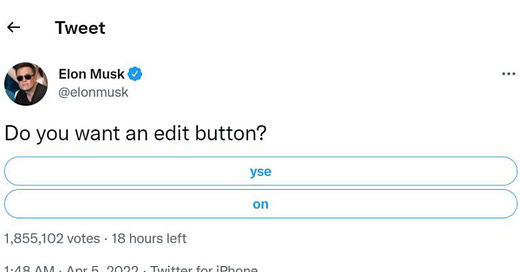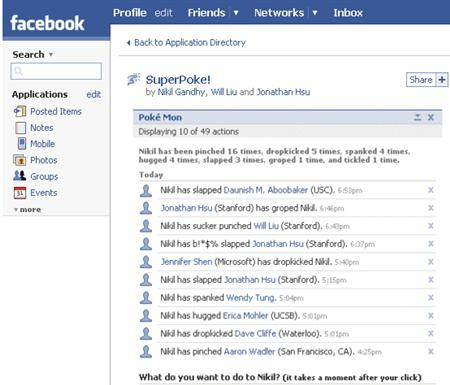Elon, Decentralized Twitter and the Ghosts of Facebook Past
Facebook Platform, Twitter-as-a-Protocol and the problems that tokens can/cannot solve.
Zuck’s Jack’s Dream
Stop me if you’ve heard this, but the world’s richest man closed a deal to buy Twitter last week.
If you’re interested in the implications of this deal for free speech, there are about 10,000 articles you can read. So I’m going to steer clear of that debate.
I’m more interested in an adjacent topic that has surfaced in light of Musk’s takeover. What if Twitter stopped seeing itself as an ad-supported social media product? What if, instead, it reimagined itself as an open protocol for global conversation?
Jack Dorsey, himself, added fuel to this fire with his tweet last week:

Musk’s plans for Twitter are opaque, but he has done little to quell the idea of a more open Twitter.
At TED, he suggested that he sees Twitter as a public good and is not worried about the economics. He tweeted that the Twitter algorithm should be open-sourced. In leaked investor pitches, Musk suggested Twitter could open new non-ads revenue streams. Each of these plans would line-up with the idea of an “Open Twitter.”
We don't know exactly what that means. But for our purposes, I’m going to imagine that Jack and Elon's vision could look something like this:
The Twitter graph and Twitter content are opened as a protocol. This allows any developer to build on them with equal standing to Twitter.
Twitter's ranking algorithm would be open sourced allowing developers to launch competing sites.
Twitter would still have an ad-supported site. But it would monetize its protocol through developer adoption and user payments.
These are all interesting ideas. But I can’t shake the feeling that they’re also… a bit familiar.
You may not remember the aughts... But there already was a controversial social media billionaire CEO that tried to remake his site as an open platform.
Mark Zuckerberg once believed that users should be able to take their friends with them to any product.
He believed that developers should treat Facebook's data as an open resource.
He believed that Facebook would be the underlying social protocol, but other apps would outperform Facebook's own.
He even believed that major changes to the policies of that platform should be governed by user vote... like, say a DAO.
The Facebook Open Graph platform was, in 2007, the most optimistic version of an open Twitter.
Now, it’s a Silicon Valley truism that, “Early is just another word for wrong.” So it’s possible that Twitter can now succeed where Facebook failed. But what would be different this time? Are there lessons that Zuck can teach Elon?
The Rise and Fall of the Facebook Platform
In September 2006, Facebook was a fledgling competitor of MySpace. But Zuck’s team was preparing two big releases that would catapult Facebook into the big leagues. First, they unveiled the News Feed. Next, they opened up the site from students to anyone over the age of 13.
The bets worked. Between 2006 and 2007, the site grew from 12 Million monthly users to 58 Million. By 2009, it would have 360 Million. But these bets not only grew the user base. They set up Zuck’s vision for Facebook as a platform for other developers.
As David Kirkpatrick recalled in The Facebook Effect, Mark Zuckerberg had always harbored an ambition to build a platform. In 2006, he saw his opportunity.
Facebook’s Photos and Events products were the most popular apps of their kind on the internet. And this was despite being jankier and less full-featured than competitors. As Zuck explained:
“So why were photos and events so good? It was because despite all their shortcomings they had one thing no one else had. And that was integration with the social graph. [...] We have the most powerful distribution mechanism in a generation.”
Zuck believed he could offer this social graph as a platform to other developers. If he succeeded, Facebook would no longer have to out-compete every social startup. They would move from social app to social infrastructure.
If successful, it would entrench Facebook as the center of the social web. It would also unleash a new wave of social app entrepreneurs.
“Zuckerberg decided that what Facebook did uniquely well was maintain your personal profile and your network of friend connections. Ultimately, almost everything else will be done by competitors.”
Look - a company owned platform is not exactly the same as a community-owned protocol, but we have to credit where it's due. This was the closest execution of an open social protocol possible in 2007. It was visionary.
And developers responded. Zuck had hoped that they might attract 5,000 developers in the first year. Instead, they attracted 250,000 developers and 25,000 applications. By the end of 2008, 95% of Facebook’s users were utilizing at least one Facebook Platform app.
This was the era of Farmville and Superpoke. It was the era of Bumper Stickers and iLike. Each month brought a new hit social app built on Facebook.
But the spectacular growth obscured an important reality. Facebook’s platform developers were undermining Facebook the product.
The business hypothesis for Platform had been simple.
1.Platform apps attract users to Facebook.
2. This generates more page views and more data.
3. Ads will monetize both of those assets.
On the surface, then, Facebook and its developers were aligned. Developers wanted user engagement and so did Facebook. Both sides would stand to gain from monetizing user attention.
But in reality, Facebook misread its value proposition to developers. Facebook believed its core value to developers was social data. But its actual core value was a high signal distribution mechanism. Facebook offered access to this channel as a public good. But if you give everyone access to a public good, there’s a tragedy of the commons waiting to unfold.
Developers virally grew their apps by making each user send invites to their friends. Suddenly, News Feed had less photos from parties and more requests to join your friend on Mafia Wars. If sending all this spam made Facebook less attractive to users... well – everyone else was doing it, too.
What Facebook began to see was that these app developers did not share the same interests as the company. Developers would happily extract growth from the site until the channel collapsed.
Facebook, of course, was focused on its own sustainability. As anyone familiar with social media will tell you, the company changes its mind about who gets distribution on a whim.
So Facebook began to shut off channels for distribution. They revoked the ability of developers to reach users through high signal channels like notifications.
Of course, this was not the only factor in the platform's demise. In the same year that Facebook introduced Platform, Apple had introduced the iPhone. The mobile platform proved more powerful than the social one.
Apple’s own platform rules prevented Facebook from offering embedded apps and games. As mobile took off, the Open Graph accelerated its death spiral. The platform would linger in the back-pages of facebook.com for years.
It finally died an ignominious death in 2018. The Cambridge Analytica scandal recast Facebook's original vision of an open, portable data platform as an Orwellian nightmare. No one much noticed when it was killed.
Lessons for the Twitter Open Protocol
With that cautionary tale in mind, we can now ask: why would this time be different? Let’s start with the bullish points:
The Possibility of New Business Models
Facebook believed its Platform could strengthen its nascent ad business while opening new revenue streams: Virtual goods! Gift cards! A marketplace!
But in 2007, those businesses were far from proven. College kids at that time were just not going to buy that much online. Meanwhile, Google had shown that advertising could build an empire.
An ads business model demands a product that can reliably attract customer attention. This, in turn, necessitates a tightly integrated product. After all, if I can get Facebook content or interact with my friends on other platforms, why should I log-on to Facebook.com?
If Twitter is going to open their network, they will need a new business model. Here there's reason for optimism. 2022 is not 2007.
Twitter, for example, could unbundle the “layers” of its platform. Each layer would have its own monetization possibilities.
It's not a clear slam dunk. It's hard to imagine these services outperforming the Facebook ad juggernaut. But Twitter has never been as good at playing that game, anyway. This might be a game it could win.
Tokens Provide for More Aligned Incentives
Maybe the biggest lesson of Facebook's Platform is that developer incentives need to align with the platform's.
The simplest way to align incentives is to share ownership. And, so, of course, we need to think about tokens. Traditional equity-share arrangements are too onerous for an open ecosystem of >10k developers.
But Twitter could create tokenized ownership of its protocol. Popular developers and creators could earn tokens for positive contributions. Lay-users could pay for premium services or subscriptions with Twitter tokens (giving them innate value).
Twitter might even be able to use a "staking" mechanism. This could require developers to collateralize tokens and forfeit them if they violated policies.
Of course, tokens are not exactly a proven mechanism for encouraging long-termism. If the goal is long-term alignment rather than speculative WAGMI energy.... well, there are not a lot of great examples to follow.
If Twitter can figure that one out, the entire web3 ecosystem would follow their example.
It's not the protocol. It's distribution, stupid.
The real challenge is that Jack's vision makes a similar mistake to Zuck's.
Twitter's value is not as a technical protocol. It’s not its unique 140 character format. (Seriously, that's just a really short email.) Nor is it in a list of contacts. (I have that in my phone contacts...) Its value is the reach of the platform. It's in my ability to Tweet @elonmusk and hope he replies.
A social protocol is only valuable if it allows creators to reach their audiences.
And this creates an unavoidable conflict between creators and consumers. Developers desperately want to be heard and users desperately want to be left alone.
"OK," you might counter, "But an open Twitter will allow many new surfaces to bloom! This will enable developers to reach excited followers and leave the rest of us alone."
Maybe. Over the long run. But on Day 0, Twitter will still be the place that protocol users get their updates. And to attract those users for their app, developers will have to reach into Twitter. So Twitter’s algorithm will continue to control distribution to the Twitter graph.
The challenge that needs to be solved for an open social platform is not how to decentralize data – but how to decentralize distribution. And here, the inspiration needs to look less like Twitter and more like Email or Texting. Problem 1 for an Open Twitter needs to be how do I reach my followers off of Twitter.
Unless and until there is a viable way to reach that audience, an “open protocol” is just good marketing copy.
And, unfortunately, it doesn’t seem that Tokens are going to fix that.







